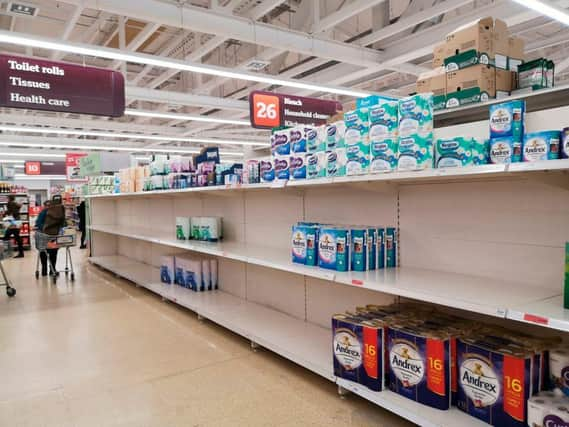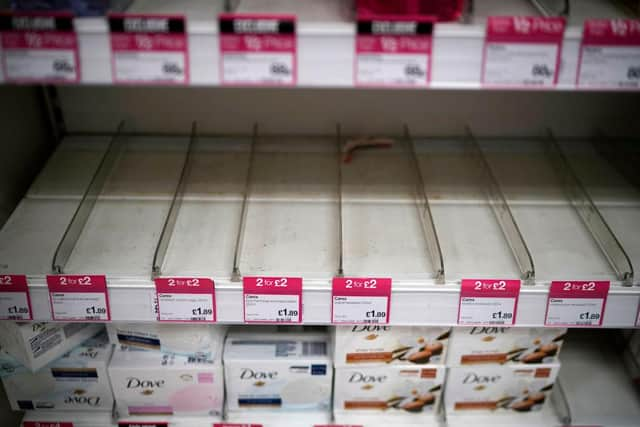Why are people panic buying toilet roll? if there's a toilet roll shortage - and which supermarkets are limiting supplies


UK supermarkets are limiting the amount of certain items customers can buy in an attempt to prevent panic-buying from cleaning them out.
The list of limited items includes pasta, hand soap, long-life milk and toilet paper.
Advertisement
Hide AdAdvertisement
Hide AdToilet paper in particular has been in the spotlight after a video of two women fighting over rolls of it in an Australian supermarket went viral.


The same problem has cropped up around the world as the coronavirus continues to rapidly spread.
Here’s why people are bulk-buying toilet roll - and whether it’s a good idea.
Why are people panic-buying toilet roll?
Naturally, no-one believes that toilet paper will provide them with any kind of special protection against the coronavirus.
However, faced with the prospect of being directed to stay home for an extended period of time, no-one wants to run out of the essentials.
Consumer behaviour expert Dr Rohan Miller told the BBC that "I think people want to make sure they have some comforts in their lives if they're going to be shacked up with their family for a long time.”
This is why items like toilet roll find themselves on people’s panic-buy lists alongside the absolute necessities :"Toilet paper doesn't really matter - it's just so far down the survival list compared to other things like food or water - but it's just something people cling to as a minimum standard."
At a time when no-one knows exactly what to expect from this virus, preparations like this can act as a source of reassurance for some people, according to Professor Nikita Garg from the University of South Wales.
Advertisement
Hide AdAdvertisement
Hide AdShe told the BBC that, unlike with the natural disasters which many people are used to preparing for “people aren't certain as to how things are going to pan out, or how much worse it's going to get."
"They want to be prepared because it's the one thing they can do to get some sense of control."
Panic-buying also tends to provoke more panic-buying due to a psychological phenomenon known as FOMO syndrome - Fear Of Missing Out.
Professor Garg said that some will panic-buy because “They think if this person is buying it, if my neighbour is buying there's got to be a reason and I need to get in too
What else might shops run out of?
The coronavirus has also sparked a wave of germaphobia as people attempt to follow the official guidelines for preventing the spread of the virus by washing their hands as often as possible.
This has led to a shortage of hand soap, hand sanitisers and antibacterial wipes in many places. Other cleaning products like bleach have similarly seen a surge in sales.
The demand for these products has been so high that their resale value has risen as much as 5,000% in some cases – with 49p bottles of hand soap selling on eBay for £24.99.
Tesco has already limited high demand items like dried pasta and tinned tomatoes to five per customer, while many other supermarkets are limiting the sale of anti-bacterial gels two per customer while stocks last.
Is bulk-buying supplies a good idea?
Advertisement
Hide AdAdvertisement
Hide AdPublic Health England has advised people to “plan ahead” in case they are forced to self-isolate.
However, as the self-isolation period would likely be a couple of weeks at most, you are unlikely to need hundreds of rolls of toilet paper.
The government’s chief scientific advisor, Sir Patrick Vance, has stated that there is “absolutely no reason” for people to be panic-buying at this time.
Boris Johnson echoed this, stating that “We’ve had no advice from the scientific advisers or medical officers that there’s any need for people to buy stuff in.”
He added that, rather than ensuring their own supplies and leaving others to go without “It is very important that everybody should behave responsibly and think about others."
Coronavirus: the facts
What is coronavirus?
COVID-19 is a respiratory illness that can affect lungs and airways. It is caused by a virus called coronavirus.
What caused coronavirus?
The outbreak started in Wuhan in China in December 2019 and it is thought that the virus, like others of its kind, has come from animals.
How is it spread?
As this is such a new illness, experts still aren’t sure how it is spread. But.similar viruses are spread in cough droplets. Therefore covering your nose and mouth when sneezing and coughing, and disposing of used tissues straight away is advised. Viruses like coronavirus cannot live outside the body for very long.
What are the symptoms?
Advertisement
Hide AdAdvertisement
Hide AdThe NHS states that the symptoms are: a dry cough, high temperature and shortness of breath - but these symptoms do not necessarily mean you have the illness. Look out for flu-like symptoms, such as aches and pains, nasal congestion, runny nose and a sore throat. It’s important to remember that some people may become infected but won’t develop any symptoms or feel unwell.
What precautions can be taken?
Washing your hands with soap and water thoroughly. The NHS also advises to cover your mouth and nose with a tissue or your sleeve (not your hands) when you cough or sneeze; put used tissues in the bin immediately and try to avoid close contact with people who are unwell. Also avoiding touching eyes, nose and mouth unless your hands are clean.
Should I avoid public places?
Most people who feel well can continue to go to work, school and public places and should only stay at home and self isolate if advised by a medical professional or the coronavirus service.
What should I do if I feel unwell?
Don’t go to your GP but instead call NHS 111 or look online at the coronavirus service that can tell you if you need medical help and what to do next.
When to call NHS 111
NHS 111 should be used if you feel unwell with coronavirus symptoms, have been in a country with a high risk of coronavirus in the last 14 days or if you have been in close contact with someone with the virus.
Sources: World Health Organisation and NHS
